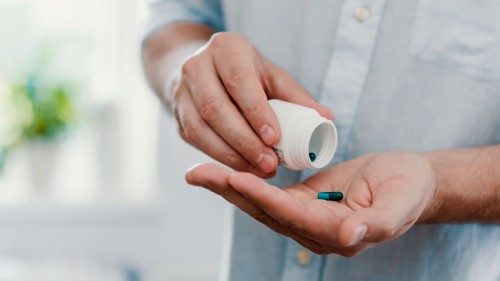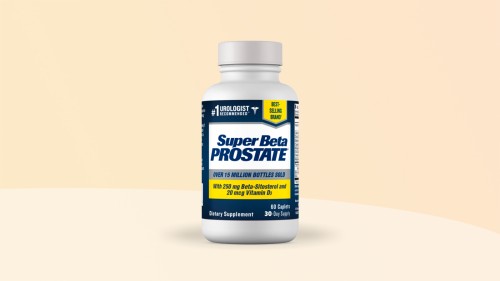Enlarged Prostate Diet: A Dietitian Lists Foods to Eat and Avoid
Last Updated on September 28, 2023
Medically Reviewed by Anthony Dugarte, MD
If you have an enlarged prostate, you may be wondering what foods are good for shrinking your prostate. There are several you can include and some you should avoid.


Enlarged prostate, also known as benign prostatic hyperplasia (BPH), is a non-cancerous enlargement of the prostate. As a natural part of aging, a man’s prostate gland grows larger. For some men, this growth is uneventful, but for others, it can lead to BPH.
Studies show that 50% of men between the ages of 51 and 60 and 90% of men over 80 are diagnosed with BPH. (1)
Your diet can impact your overall health and the health of your prostate. For men, certain foods can help reduce uncomfortable symptoms. Meanwhile, there are also certain foods you may want to limit or avoid to keep your prostate healthy.
Foods to Eat for Prostate Health
Some studies have shown that certain foods may decrease the risk of BPH and also improve symptoms:
Cruciferous Vegetables
Cruciferous vegetables include broccoli, cauliflower, cabbage, Brussels sprouts, bok choy, and kale.
Cruciferous vegetables are a rich source of antioxidants, vitamins, minerals, and phytochemicals. These phytochemicals may help prevent cancer cell growth.
Studies show that eating cruciferous vegetables can lower inflammation related to BPH symptoms and reduce prostate cancer risk. (2)
One study showed that increased vegetable consumption was associated with both reduced symptoms and incidence of BPH. (3)
Berries
Berries like strawberries, raspberries, and blackberries, are high in vitamin C and contain powerful antioxidants.
Studies demonstrate that vitamin C may help reduce benign prostatic hyperplasia (BPH) symptoms by stimulating urination and decreasing inflammation. (4)
Antioxidants play an important role in the body as they can block damage from free radicals, which are compounds that attack healthy cells.
A diet rich in antioxidants may also contribute to reduced cancer risk including lower prostate cancer risk.
Tomatoes
Lycopene, a potent antioxidant, can be found in the cell walls of tomatoes.
The bioavailability (how well your body can absorb the nutrient) of lycopene is increased when tomatoes have been cooked, particularly when cooked with oil.
One research study suggests that the various anti-inflammatory compounds found in tomato extracts may reduce inflammation associated with BPH symptoms. (5)
Fish
Cold-water fish like salmon, sardines, and trout provide a rich source of omega-3 fatty acids which don’t promote inflammation in the same way as saturated animal fats do.
In fact, fish containing omega-3 fatty acids have anti-inflammatory properties that may help diminish some urinary symptoms associated with BPH.
Pumpkin Seeds
Pumpkin seeds contain protective compounds called phytosterols, which may be responsible for reducing prostate enlargement.
Additionally, pumpkin seeds are a great source of zinc. Zinc is considered a prostate health food because normal prostate functioning relies on optimal zinc levels.
Zinc may be able to help prevent the BPH, and also help reduce the size of an enlarged prostate due to its anti-inflammatory properties.
One 2014 study found that treatment with pumpkin seeds led to a significant reduction in BPH symptoms. (6)
Consider Taking Supplements
Studies have shown that taking zinc, vitamin D, and saw palmetto may help reduce symptoms related to an enlarged prostate. (7)
While many prostate supplements contain ingredients that are generally safe, some side effects of taking these supplements may include mild gastrointestinal distress.
Additionally, if you are experiencing any urinary symptoms, it’s important to discuss them with your healthcare provider before taking any supplement to rule out anything more serious.
Foods to Avoid for Prostate Health
According to some studies, some foods may worsen the symptoms of BPH and can lead to other prostate issues.
Red Meat
Red meat can elevate the levels of a certain type of fat in the body called arachidonic acid, which can lead to increased inflammation.
Increased inflammation in the body can worsen symptoms of BPH.
Results from one 2018 study found that meat intake was strongly and significantly associated with prostate cancer incidence. (8)
Researchers suggested that total meat intake may be a major predictor of prostate cancer regardless of the influence of other risk factors, like aging and obesity.
Swapping out red meat for plant-based proteins like beans, lentils, or tofu will help keep the prostate healthy.
Dairy
Having too much dairy may lead to having too much fat. Excess fat can lead to weight gain which can increase BPH symptoms.
Dairy intake may also increase inflammation throughout the body which can aggravate prostate-related symptoms.
A 2015 meta-analysis from the American Journal of Clinical Nutrition found high intakes of dairy products, including whole and low-fat milk and cheese, may increase the risk for prostate cancer. (9)
There are plenty of dairy-free alternatives to try, including almond milk, cashew milk, and coconut milk.
Alcohol
Following an enlarged prostate diet means reducing alcohol intake, or avoiding alcohol altogether.
Alcohol is inflammatory and will increase inflammation of the prostate. Moreover, alcohol can relax the urinary tract muscles which may lead to more urgency and frequent urination.
Caffeine
Avoiding or limiting caffeine intake can also benefit prostate health.
Similar to alcohol, caffeine is also a diuretic that can increase the urge to urinate but also can intensify bladder discomfort.
Spicy Foods
Spicy foods like chili, curries, and hot sauces may add flavor to a meal but can also irritate the bladder.
Spicy and acidic foods can lead to bladder pain which can cause urinary symptoms associated with BPH.
How to Start
- Try adding some broccoli or spinach to your eggs in the morning.
- Come lunchtime, pile some fresh veggies on your sandwich including lettuce, tomato, cucumber, sprouts, or avocado.
- Skip the chips or fries at lunch and try a side salad or fruit cup.
- Try eating a fresh salad with your dinner and cooked vegetables. If you don't feel like chopping veggies, try salad in a bag and a side of steamed frozen vegetables.
Additional Lifestyle Considerations
In addition to following an enlarged prostate diet, there are some other natural ways to help manage symptoms related to an enlarged prostate.
Regular Exercise
Exercise is an excellent way to reduce the body's inflammatory response and, in turn, help reduce symptoms associated with an enlarged prostate.
One 2014 study found that reducing sedentary time could have a protective effect and also reduce the prevalence of BPH. (10)
Another study also showed that men who were more physically active were less likely to suffer from BPH. (11)
Researchers suggested that even low- to moderate-intensity physical activity, such as walking regularly, can benefit prostate health.
Related: How to Start Exercising: A Beginner’s Guide
Maintain a Healthy Body Weight
Carrying extra weight around may impact prostate health. Many studies have shown that obese men are at a higher risk for developing BPH. (12)
Obesity can also worsen urinary symptoms associated with BPH.
The Bottom Line
While some foods might shrink the prostate gland, there are others that will increase the prostate size and further promote uncomfortable urinary symptoms.
Adopting a healthy lifestyle may help to reduce the risk of prostate health issues as you age. Eating plenty of fruits and vegetables, reducing meat consumption, and participating in regular exercise can be the best medicine to enhance prostate health.
At WellnessVerge, we only use reputable sources, including peer-reviewed medical journals and well-respected academic institutions.
- The Efficacy of Stinging Nettle (Urtica Dioica) in Patients with Benign Prostatic Hyperplasia: A Randomized Double-Blind Study in 100 Patients:
https://www.ncbi.nlm.nih.gov/pmc/articles/PMC3589769/ - Vegetables, fruits, legumes and prostate cancer: a multiethnic case-control study:
https://pubmed.ncbi.nlm.nih.gov/10952096/ - Fruit and Vegetable Intake in Relation to Lower Urinary Tract Symptoms and Erectile Dysfunction Among Southern Chinese Elderly Men:
https://www.ncbi.nlm.nih.gov/pmc/articles/PMC5291566/ - Fruit and vegetable consumption, intake of micronutrients, and benign prostatic hyperplasia in US men:
https://academic.oup.com/ajcn/article/85/2/523/4649585 - Bioactivities of phytochemicals present in tomato:
https://pubmed.ncbi.nlm.nih.gov/30065393/ - Effects of pumpkin seed in men with lower urinary tract symptoms due to benign prostatic hyperplasia in the one-year, randomized, placebo-controlled GRANU study:
https://pubmed.ncbi.nlm.nih.gov/25196580/ - Benign prostate hyperplasia and nutrition:
https://pubmed.ncbi.nlm.nih.gov/31451276/ - Prostate Cancer Incidence is Correlated to Total Meat Intake– a Cross-National Ecologic Analysis of 172 Countries:
https://www.ncbi.nlm.nih.gov/pmc/articles/PMC6171413/ - Dairy products, calcium, and prostate cancer risk: a systematic review and meta-analysis of cohort studies:
https://academic.oup.com/ajcn/article/101/1/87/4564339 - The Study About Physical Activity for Subjects With Prevention of Benign Prostate Hyperplasia:
https://www.ncbi.nlm.nih.gov/pmc/articles/PMC4180167/ - Physical activity and benign prostatic hyperplasia:
https://pubmed.ncbi.nlm.nih.gov/9827786/ - The impact of obesity towards prostate diseases:
https://www.ncbi.nlm.nih.gov/pmc/articles/PMC4789344/






